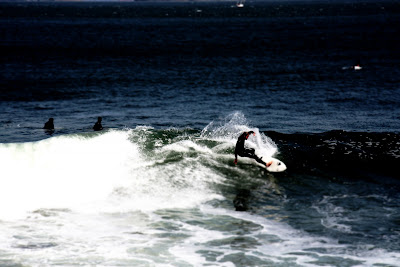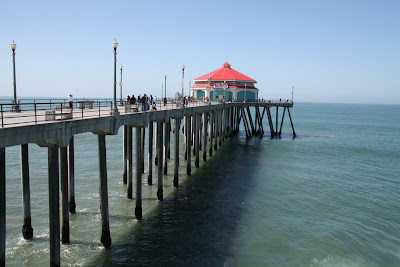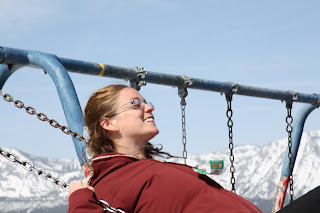Sunday, April 25, 2010
Monday, April 19, 2010
Friday, April 16, 2010
California Beaches




You know those smells? Those powerful and magical smells from a distant memory that lash your nostrils, fill you with nostalgia and slap you back through time to the moment when you first smelt them?
A personal example for me would be the textas we used in primary school, especially the brown ones smelt like a cross between chocolate and strawberries. It was the most prized possession in the classroom just in front of a good feed on clag glue. Even now when I get a whiff of that exotic goodness I’m right back at
Back to the present day, I was at
Summer in
I miss summertime.
Wednesday, April 14, 2010
Thursday, April 1, 2010
‘Throw another Shrimp on the Barbie Mate’ - Australian English for Canadians
Australians may well be the laziest nation in the world when it comes to speaking. Any words containing more than three syllables are chopped in half and an ‘O’ is added on the end. For example ‘afternoon’ becomes arvo, ‘ambulance’ becomes ambo and ‘Bottle Shop’ becomes the Bottlo. Other common examples are; rego, Robbo, yobbo, servo, garbo, refo, rego, relos,
This ability to abbreviate absolutely any word is a gift all Australian children are born with. Other examples are arvo (afternoon), brekky (breakfast) and barbie (barbecue).
G’day is universally accepted as the traditional Aussie greeting. ‘G’day is synonymous with "good day" in other varieties of English, but is never used as an expression for "farewell", as "good day" is in other countries. It is simply used as a greeting.
Another common Aussie greeting is "owyergoinmateorright?" Interpreted for everyone else this means "How are you going, mate? All right?" However when I say this the seemingly simple inquiry is literally interpreted by Canadians as; ‘by what method of transport are you traveling?’ and produces a very confused look on every Canadians face.
Many other everyday Australian terms and words will produce politely confused looks on Canadians faces.’ The phrase ‘fair dinkum’ is often interpreted as ‘fat income’. "Fair dinkum" actually means "true", "is that true?" or "this is the truth!” among other things, depending on context and inflection.
Whenever I use an incomplete comparisons like ‘sweet as’ I get a lot of very strange looks. Canadians think I am being rude and saying ‘sweet arse’
Australians seem to be very reluctant with their information. Being in Canada has made me realize that we answer many questions prefaced with the word ‘not’.
Examples of this phenomenon are;
‘How are you’? “Not bad”
‘Where you been’? “Not far”
‘What you doing’? “Not much”
Aaaahh....the refinements of the Australian dialet or "Strine" as it is known. Terms like, strewth, you beauty, bonzer, drongo, hard yakka, cooee and crikey are unique and part of a very sophisticated and language great heritage.
If you are not an Australian and you understood any of this then ‘onya mate’! If not then, don’t feel like a ‘dingbat’ just ‘avago ya mug’!





















